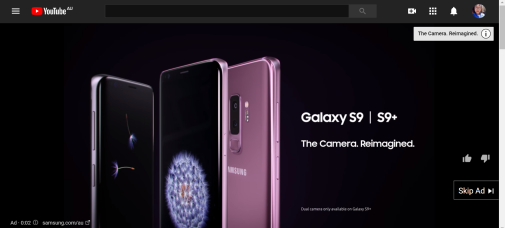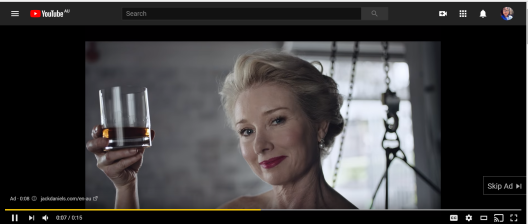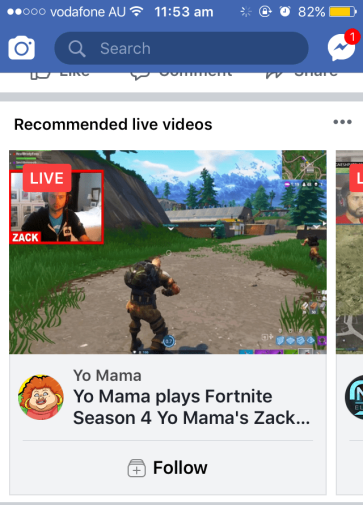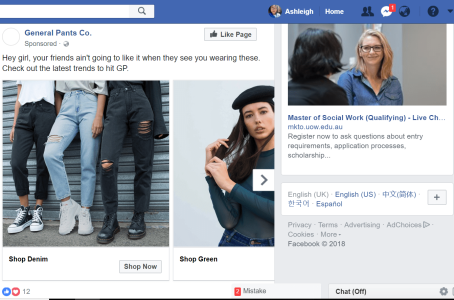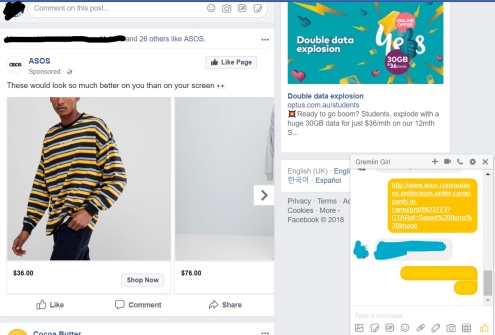Digital Artifact Posts are here: 1, 2, 3, 4, and 5.
In the Digital Artifact ideas in the Cyber Surveillance topic were experimented with, a series of blog posts were made the first three being about how everyone in society is being monitored by these Smart devices and how this surveillance shows itself in the form of Targeted Advertising. The first three blog posts posted included screenshots of a multitude of Advertisements from three social media websites, Facebook, Instagram and YouTube. Then sentence answers were put for why that ad might’ve been targeted specifically, the answers involving: Mentioned the product in a message to someone, Searched for that product or brand, saying it in a real life conversation with the phone nearby.
Other ways people are being monitored is discussed in posts four and five, where how Google and Facebook stores data on people was investigated with the help of Twitter Privacy Consultant Dylan Curran. Post five in particular has information on downloading data from Facebook from my personal account in the past five months, so all from 2018. Even in that small time frame there was an abundance of data collected, approximately 759MB. From Google the information available comprises of every single thing someone searches, all the times things are searched, what social media sites are used and when, every video watched. Absolutely everything.
Facebook was the same deal but even more data, anything someone can possibly think of is logged. Every time someone logs on and off, the location they log on from, every message they send and receive, gifs, videos, pictures, audio messages, comments even when deleted from the actual website or app, it’s possible to get back all that data just by downloading it and it doesn’t take long at all. Post five which is “In Downloading my Facebook Data”, shows instructions on how people may find the downloading data page if they might be curious as to what Facebook has about them.
One part in post five also mentioned is Ad Interests, this is a section in the data that includes a long alphabetical order list of Interests Facebook associates with that person. The data on this collected every minute of the day, a simple mention of a celebrity and suddenly that person is in the list.
This idea of Cyber Surveillance has been drastically normalised in the past few years alone, people are constantly creating content of their own lives and posting those online in the form of Vlogs, on the other side even more content is being produced by Reality Television and as this quote suggests “We watch people go about their lives under surveillance” (PBS, 2014). So relating this back to the topic it makes people think, are they as aware of how much Surveillance is truly going on in the world? Or do they just not see it as strange and something to worry about? In the Digital Artefact this is another part of the topic being explored.
In conclusion Cyber Surveillance is just another part of this future culture that everyone coexists in, it doesn’t seem to be something people can change and this concept of privacy is blurred which is contributing to the normalisation that’s currently occurring, this is just seen as a normal aspect of being alive in the 21st century. While there is more awareness on the topic there isn’t full complete awareness, many people do not know just how deep Surveillance goes and the extent of the monitoring.
References:
Allmer T, Fuchs C, Kreilinger V, & Sevignani S, 2012. Critical Perspectives and Empirical Findings. Social Networking Sites in the Surveillance Society, Pgs. 57-60.
Alphr/Vaughn Highfield. 2018. How to see everything Facebook knows about you – but be warned, it may not be pretty. [ONLINE] Available at: http://www.alphr.com/facebook/1003521/see-everything-facebook-knows-about-you-here-s-how. [Accessed 18 April 2018].
Engadget. 2017. Public Access – Cyber Surveillance – Friend or Foe?. [ONLINE] Available at: https://www.engadget.com/2017/01/23/cyber-surveillance-friend-or-foe/. [Accessed 14 March 2018]
Lyon, D, 2001. Issues In Society. Surveillance Society: Monitoring Everyday Life, [Online]. 2, ix. Available at: https://books.google.com.au/books?hl=en&lr=&id=aXXlAAAAQBAJ&oi=fnd&pg=PP1&dq=surveillance+in+everyday+life&ots=LwSYwdf54l&sig=cUcBG2S3_sD1y6trD1O1yrFmsNw#v=onepage&q&f=false[Accessed 14 March 2018].
Nick Bilton. 2013. The Pros and Cons of a Surveillance Society – The New York Times. [ONLINE] Available at: https://bits.blogs.nytimes.com/2013/07/16/the-pros-and-cons-of-a-surveillance-society/. [Accessed 15 March 2018].
PBS Idea Channel. (2014). Does Reality TV Affect Our View On Surveillance? | Idea Channel | PBS Digital Studios. [Online Video]. 15 January 2014. Available from: https://www.youtube.com/watch?v=wMLCZAKfEsk. [Accessed: 20 April 2018].
Podesta, D, 2015. Media in the Age of Cyber Surveillance. Watchdogs Under Watch, [Online]. Pgs. 3 & 4. Available at: https://www.rnw.org/sites/flagship.rnw.org/files/cima_cyber_surveillance_paper_web.pdf[Accessed 12 April 2018].
Stefanone MA, Lackaff D, 2009. Reality Television as a Model for Online Behavior: Blogging, Photo, and Video Sharing. Journal of Computer-Mediated Communication, [Online]. N/A, Pgs. 964–987. Available at: https://onlinelibrary.wiley.com/doi/abs/10.1111/j.1083-6101.2009.01477.x [Accessed 21 April 2018].













